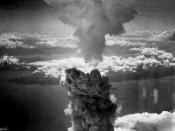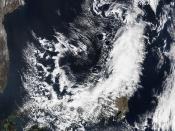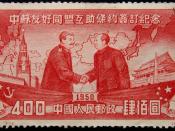On July 25, 1945, President Truman ordered the military to drop two atomic bombs on Japan. The United States warned Japan that they would face "prompt and utter destruction" unless Japan surrenders. Japan refused. On August 6, Enola Gay dropped an atomic bomb named Little Boy over Hiroshima, an important military base. Japan still did not surrender. On August 9, the second bomb named Fat Man was released on Nagasaki. By the end of the year, approximately 200,000 people died from injuries and radiation from the atomic explosions. Emperor Hirohito surrendered in September. The bomb never should have been dropped on Japan.
There were alternatives to make Japan surrender other than the killing of innocent civilians. The US could have invited Japanese officials to view the testing of the bomb at Los Alamos, New Mexico. After seeing the destructive power of the bomb, the officials could make an informed decision.
Another reason that the US did not need to drop the bomb was that the US is already winning the war in Far East. A naval blockade was interfering with Japan's ability to import oil and other resources and its ability to produce weapons and supplies. By the beginning of September, Japan's industries were basically starved through the blockades. By continuing the blockade, Japan will be forced to submit.
The warning given to Japan before Hiroshima was inadequate. One flaw of the United State's warning issued to Japan was their failure to inform of Russia's possible invasion. By the end of the war, Soviet Union had rebuilt their army and was looking to gain land. If Japan had been aware of the Soviet's plan to invade, then they would have known a loss is unavoidable. With a weakened navy and air force, it was almost impossible for Japan to win...



Omg
oh my god! i thought this essay would suck! i myelf thought it was down right horrible! to my surprise , it actually has good scores!
1 out of 1 people found this comment useful.